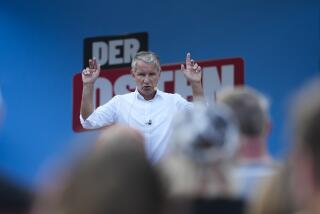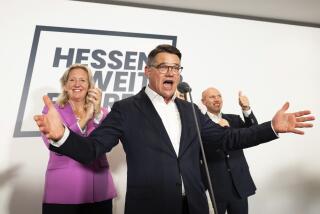Date Certified for Unified German Elections--Dec. 2
WEST BERLIN — Dec. 2 was fixed Thursday as the date for East Germans and West Germans to elect their first unified government in 57 years.
The announcement was made by the West German Cabinet, bringing to an abrupt end a week of heated political squabbling in the parliaments of both countries. It dealt West German Chancellor Helmut Kohl his first political setback since the Berlin Wall opened last Nov. 9.
East German Prime Minister Lothar de Maiziere touched off the dispute last week when he unexpectedly called for all-German elections and a merger with West Germany on Oct. 14, advancing the unification calendar by nearly seven weeks. The East German Parliament, the Volkskammer, approved the plan Wednesday after an all-night session.
Kohl had strongly supported the earlier election and merger, but he backed down Thursday when it became clear that he could not rally the necessary support in the Bundestag, the lower house of the West German Parliament. The Bundestag balked at the constitutional changes that would be necessary to alter the timetable.
No date has been set for East Germany to dissolve itself and merge with West Germany.
Kohl and De Maiziere, both Christian Democrats, want the elections and the merger to take place on the same day, but the opposition Social Democrats want the merger Sept. 15 and the election Dec. 2, in the hope that a longer campaign will weaken Kohl’s bid to lead the unified country.
Kohl, long regarded at home and abroad as a somewhat clumsy and provincial leader, has been riding a wave of popularity since the wall was breached last autumn. he managed to persuade Soviet President Mikhail S. Gorbachev not to oppose a united Germany’s membership in the North Atlantic Treaty Organization and to withdraw 360,000 Soviet soldiers from East Germany within four years.
Kohl, 60, is considered the front-runner in the campaign, but analysts say his star could dim as West German taxpayers grow increasingly anxious about the staggering costs of unification.
He has promised not to raise taxes in order to pay for unification, but he admitted recently that the East German economy is in worse condition than had been thought as the result of corruption and mismanagement by the Communists.
Kohl’s challenger, Social Democrat Oskar Lafontaine, has accused Kohl and his advisers of covering up the true costs of unification to improve his reelection chances.
More to Read
Sign up for Essential California
The most important California stories and recommendations in your inbox every morning.
You may occasionally receive promotional content from the Los Angeles Times.










